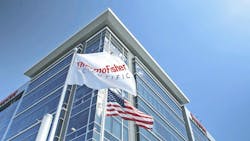Thermo Fisher Scientific’s CDMO business is poised for growth, say analysts
Thermo Fisher Scientific got a vote of confidence this week from William Blair analysts who initiated coverage of the life science tools and pharma services company with an “outperform” rating. The analysts expect it to continue to gain share in the contract development and manufacturing organization (CDMO) market and to benefit from “healthy” commercial drug sales and positive biopharma outsourcing trends.
“The synergies created by Thermo’s best-in-class service offerings have solidified its position as the partner of choice for the biopharma industry,” the analysts wrote in an Aug. 18 note to investors.
According to the analysts, Thermo Fisher operates one of the world’s largest CDMOs with the company’s offerings “differentiated by its strong regulatory track record and the scale and breadth of its integrated drug substance and drug product capabilities.”
The analysts expect Thermo Fisher to “continue to build on its leading position in the drug substance space thanks to its several recent large-scale capacity additions, focus on leveraging flexible single-use biologics manufacturing technologies, and strong regulatory record and suite of capabilities.”
Thermo Fisher has five drug substance facilities centered on small molecules, with two sites in South Carolina and three in Europe, where it manufactures active pharmaceutical ingredients (APIs) — including specialized and highly potent drug substances — for more than 100 commercial drugs, according to the analysts.
The company also has five facilities focused on biologic drug substance production, including a site in St. Louis, Missouri that is “among the world’s largest facilities leveraging single-use technology” and a 1.5 million-square-foot facility in Switzerland that combines both single-use and traditional stainless steel bioreactor capabilities, the analysts wrote.
However, the analysts noted that Thermo Fisher’s offerings are “even stronger on the drug product side, which accounts for the majority of its CDMO revenue.”
Thermo Fisher has eight commercial drug product sites focused on small molecules, including its recently expanded oral solid dose site in Cincinnati, Ohio, as well as five other facilities across North America and two sites in Europe.
The analysts called out the company’s six sites for injectables with capabilities across multiple formats, including its integrated small- and large-molecule finished dose site in Greenville, North Carolina, two sites in Asia, and three European sites “which combined make it the world’s largest sterile fill/finish CDMO.”
Acquisitions, investments
Last month, Thermo Fisher announced it is buying Sanofi’s sterile drug product manufacturing facility in Ridgefield, New Jersey for an undisclosed amount, expanding its strategic partnership with the French drugmaker to enable additional production capacity in the U.S. The Ridgefield site specializes in fill‑finish and packaging of aseptic injectable medications.
“Thermo will expand use of the site to meet the growing demand from pharma and biotech customers for U.S. manufacturing capacity,” William Blair analysts wrote.
Since 2017, Thermo Fisher has made significant acquisitions and organic investments to boost its pharma services offerings — which currently account for approximately a third of total sales — including the $7.2 billion acquisition of CDMO Patheon in August of that year.
Going forward, the analysts expect merger and acquisition (M&A) activity to remain a significant part of the company’s near- and long-term growth strategy.
Overall, Thermo Fisher’s pharma services business is strategically expanding in 2025 to support growth in its capacity and capabilities to better serve its customers. The company is investing in locations across its network, which includes over 60 pharma services sites across 24 countries employing a workforce of more than 2,700 scientists and engineers.
In April, Thermo Fisher announced it is making a $2 billion commitment to U.S. manufacturing and R&D over the next four years. Of that amount, $1.5 billion is earmarked for capital expenditures to enhance and expand manufacturing. The company is also expanding sterile fill-finish capabilities at its Greenville site while sunsetting traditional batch, solid dose production and adopting continuous manufacturing.
“Thermo’s ample and growing manufacturing footprint in the U.S. and Europe should be attractive to global customers who are looking to produce products in local markets to avoid recently elevated global tariffs,” the analysts concluded. “We believe the healthy outlook for pharma drug sales, increased demand for onshoring, robust outsourcing trends, and share gains will drive high-single- to low double-digit annual growth in Thermo’s CDMO business over time.”
About the Author
Greg Slabodkin
Editor in Chief
As Editor in Chief, Greg oversees all aspects of planning, managing and producing the content for Pharma Manufacturing’s print magazines, website, digital products, and in-person events, as well as the daily operations of its editorial team.
For more than 20 years, Greg has covered the healthcare, life sciences, and medical device industries for several trade publications. He is the recipient of a Post-Newsweek Business Information Editorial Excellence Award for his news reporting and a Gold Award for Best Case Study from the American Society of Healthcare Publication Editors. In addition, Greg is a Healthcare Fellow from the Society for Advancing Business Editing and Writing.
When not covering the pharma manufacturing industry, he is an avid Buffalo Bills football fan, likes to kayak and plays guitar.
